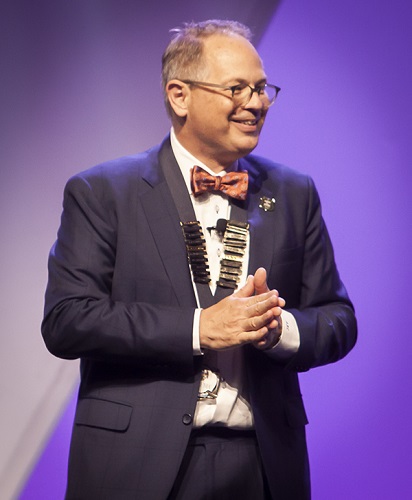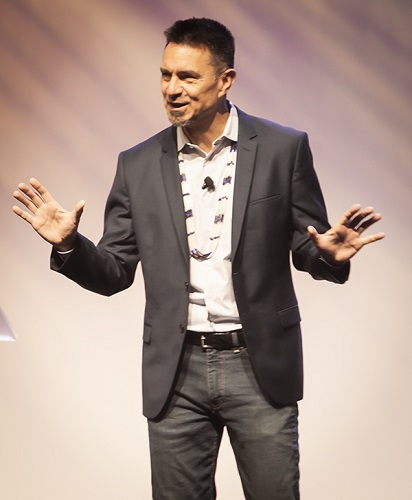HFMA’s Annual Conference: Aaron Crane describes the ‘underbrush and deadwood’ that hamper U.S. healthcare
- In his first remarks after being formally recognized as HFMA Chair for FY22-23, Aaron Crane spoke about why healthcare stakeholders must “ignite the spark” to make way for a better system.
- Keynote speaker D.J. Vanas invoked lessons from tribal traditions to explain why anyone can become a warrior and meet all of today’s challenges head-on.
- Longtime HFMA members Debora Kuchka-Craig and Jude Crowell were honored this week with the Association’s Frederick C. Morgan Individual Achievement Award.
DENVER — After being formally installed as HFMA’s new National Chair, Aaron Crane, FHFMA, CPA, MHA, exhorted Annual Conference attendees to consider how they can address a growing conflagration in the U.S. healthcare system.
As described in a recent hfm cover story, Crane has drawn on his experience living in timber country — namely, Oregon — for a metaphor about the changes required in the healthcare industry. His Chair theme is “Ignite the Spark,” a call for healthcare stakeholders to consider how they can initiate a “prescribed burn” of the sort used to prevent wildfires.
By intentionally starting smaller fires, firefighters can clear out underbrush and deadwood and preserve the health of a forest. U.S. healthcare would benefit from a similar tactic.
“Wildfires in our system result in low quality metrics at the greatest expense in the world compared to other developed countries,” Crane said Tuesday.
He cited a 2021 Commonwealth Fund report that found the U.S. ranked last among 11 comparable countries in four of five domains: access to care, administrative efficiency, health equity and healthcare outcomes (it ranked second in care processes). And as many people know, the share of GDP spent on healthcare is vastly higher in the U.S.

Where prescribed burns are needed
Said Crane: “What in our forest should be viewed as underbrush and deadwood? What serves as the fuel to magnify these issues, hindering innovation and improvement and leading the United States to perform so poorly when compared with other high-income countries?”
He pointed to the following issues:
Misaligned incentives. One statistic that illustrates the deadwood in the U.S. healthcare system, Crane said, is the prevalence of MRIs: 40 per 1 million people, or 60% more than the average in comparable countries. That comes out to an initial excess investment of $19.7 billion.
In the same vein, diagnostic thresholds have been lowered over time for conditions such as diabetes, hypertension, hyperlipidemia and osteoporosis in women, Crane noted. The result is additional “millions of people” diagnosed with chronic conditions, and many are likely to “not even be symptomatic.” Harm easily can arise from medical treatment delivered in the absence of symptoms.
“I believe this deadwood in our forest is due in large part to the incentives placed in our healthcare system [that] reward for treating symptoms and disease, rather than for maintaining and improving health,” he said.
Lifestyle choices. Tobacco use, poor nutrition, lack of physical activity and excessive use of alcohol contribute to the pervasiveness of chronic diseases, which affect 60% of Americans, according to the CDC. Two-thirds of that subset have multiple conditions, and hospital admissions are significantly higher for diabetes and heart failure in the U.S. than in comparable countries. The total cost of chronic conditions is $3.7 trillion, or 19.6% of GDP.
What’s more, by 2060, the number of Americans ages 65 and older is expected to double.
“This is a wildfire of biblical proportions that we can see coming,” Crane said.
He added, “The underbrush and deadwood are building in this forest as we continue to make lifestyle choices that are unhealthy. And then we seek care in high-cost settings.” With better choices, an estimated 30% of emergency department visits could be avoided, for annual savings of $2.5 billion.
Health inequity. Crane showed a slide with insights from the Kaiser Family Foundation, which found that mortality, morbidity, life expectancy, healthcare expenditures, health status and functional limitations are driven by social and economic inequities such as:
- Economic stability
- Neighborhood and physical environment
- Education
- Food
- Community, safety and social context
- The healthcare system
“We simply cannot achieve our highest level of cost-effective health without addressing this issue,” Crane said.
Crane said he is proud to be part of HFMA’s commitment to lead the industry in shifting its focus to optimizing the cost effectiveness of health.
“I challenge you to identify the underbrush and deadwood that are keeping your organizations and communities from being the healthy, thriving ecosystems they were meant to be,” he said. “And then I challenge you to take that next step: Ignite the spark setting the fire that brings about necessary change and innovation.”
Jackson hands off the baton
Crane was introduced to the audience Tuesday by Tammie Jackson, FHFMA, CPA, MHA, HFMA’s FY21-22 National Chair, who was saluted during Tuesday’s session for her year as Chair and long record of service to the Association.
Reflecting on her Chair theme — “Bolder. Brighter. Better.” — and how it applied during a tumultuous year for the industry, Jackson said she’s been inspired by “just so many bold decisions that we’ve made, big and small, personal and institutional, to make things better for our industry, for our society, for our Association and for ourselves.”
Keynote speaker describes how to adopt a warrior spirit
In Tuesday’s keynote presentation, D.J. Vanas, an internationally acclaimed leadership and personal development speaker, explained how healthcare leaders can channel a warrior spirit as they navigate a turbulent period.
Vanas, an enrolled member of the Ottawa Tribe and a former U.S. Air Force officer, noted that the warrior role isn’t what people may assume from how it’s presented in popular culture.
From a traditional tribal perspective, to be a warrior means to be “somebody who has dedicated their lives to developing their Creator-given talent and ability so they could be an asset or a benefit to the tribe that they served.”

Warriors embody mental toughness, allowing them to thrive amid change. And anybody can cultivate mental toughness by following a few key steps.
1. Don’t try to outrun negative emotions. When we “actually feel our feelings, it makes us more resilient,” Vanas said. “It makes us more flexible and it makes us more able to bounce back after we take those blows in life.”
2. Find joy. “What can’t be argued is there’s a lot of negativity out there,” Vanas said. “And so if we’re going to counter that, we have to foster joy in our lives.”
3. Recognize your strengths. “You are smarter than you know, you’re more capable than you know, you have more knowledge than you give yourself credit for,” Vanas said. “You are more resilient than you know, and you are stronger than you know. Until we are pushed into a space where we have to bring those things to the table, we don’t know how good we can be at who we are and what we can do.”
4. Don’t shy away from your shortcomings. “Our warriors dealt with everything that we’re dealing with today,” Vanas said. “They dealt with fear. They dealt with pain, discomfort. They’d fall down, make mistakes, stumble. Sometimes they’d cry to the heavens.
“But what they didn’t do was quit. They kept finding a way forward, desperately doing what they wanted to do, which is to become a better version of themselves. And we need that same type of mentality.”
5. Exercise self-care. “Incorporate it in your life, make it a priority, because you cannot be a warrior when you are falling apart,” Vanas said. “It does not work. If we want to be at our best, we have to put ourselves in a position to deliver that.”
2 longtime members receive HFMA’s Morgan Award
HFMA presented the 62nd annual Frederick C. Morgan Individual Achievement Award to two members this week, recognizing their career-long contributions to the Association and the healthcare finance profession.
There typically is one recipient per year, but HFMA decided to recognize two at the 2022 Annual Conference after not presenting the award in 2020 or 2021.
Debora Kuchka-Craig, FHFMA, received her award Monday. A decorated member of HFMA, Kuchka-Craig was National Chair in 2010-11 and has held numerous other national and chapter leadership roles.
“Debi’s work to support our mission is really beyond compare,” said HFMA President and CEO Joseph J. Fifer, FHFMA, CPA.
Her professional experience spans the provider and payer sides, leading up to her current position as senior vice president of managed care for MedStar Health in Columbia, Maryland.
Said Kuchka-Craig onstage Monday, “I’ve gotten so much more back than I believe I have given. The successes that I’ve been affiliated with in my work and clearly at HFMA have been, in my opinion, because of the brilliant and passionate people that I’ve had the privilege to work with.”
Jude Crowell was honored with the Morgan Award on Tuesday. As stated in an HFMA news release, “Crowell is known in the healthcare revenue cycle management field as an ardent advocate for HFMA — nationally, regionally and at the state level.” His leadership contributions with the Association have encompassed various roles at the regional and chapter levels.
In nomination letters, several of Crowell’s colleagues and fellow members singled out his commitment to driving HFMA involvement in community service projects.
Crowell, currently chief client officer for Invicta Health Solutions, was emotional as he took the stage to receive his award.
“I’m just so honored, especially when I think of all the greatly respected people who’ve received this honor before me,” he said. “Through my involvement with HFMA, the people that I’ve met along the way have truly become part of my family. HFMA is such a safe place to become a leader, to try new things and to engage with a community and your peers.”





